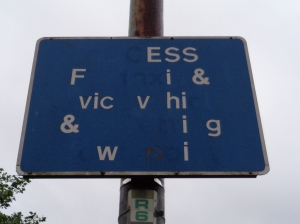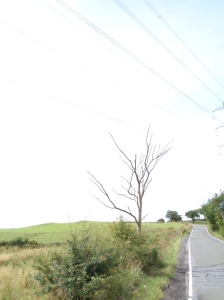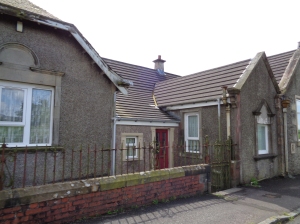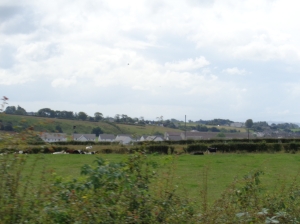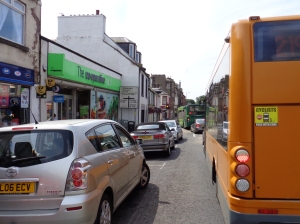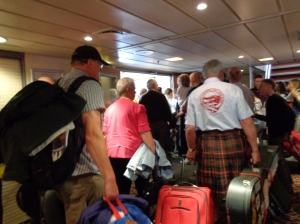‘The boss man’s here, watch out!’
‘Yeah, I’d better do some work.’
– Punter to a barmaid, Brodick.
Taking a week’s break from cycling has been a really good idea.
For one, I’ve been able to piece together notes with photos and get up to date with the writing. But homesickness can build up cumulatively. For some, there’s a need to express and experience tenderness and affection. Among strangers this is occasionally possible, but returning home, seeing my family and my partner, has been a rejuvenating tonic. And returning to London? Well in a funny way I love the place too, but that will require some explaining. I’ll save that for the end of this journey. Right now, I’m heading back up to Glasgow on a ridiculously cheap coach, returning to the city where I left my inspiration, along with a sleeping bag, tent, and bicycle.
The motorways are filled with delivery lorries bringing stuff hither and thither. One has skidded and slid over, the driver’s supply of caffeine from countless energy drinks perhaps failing him at some unlucky moment. The coach gets caught in one glut of traffic after another, and a mere ten hour journey stretches to around thirteen. To complete the misery, I have a hyperactive kid behind me tapping and kicking the chair. It’s the kind of testing exercise that would send a bodhisattva on a killing spree.
But ah, Glasgow! It’s raining as we pull into Buchanan Street bus station, but the city looks as charming as I remember. There are murals by the University of Strathclyde, those spacious streets lined with glorious Victorian stores and civic buildings, and the slow-paced ease with which people and traffic move around here. I get out into the bus station, and there’s less of the pushing and barging sprawl of London’s central stations. I walk around a little, and am reminded quickly from the body language of passers-by that the casual aggression and anti-social impatience with which many Londoners move their bodies and hold physical space when standing still is absent here. It’s still brusque and by no means gentle, but there’s a civility and respect encoded into social attitudes which gladdens me.
As I’m so late, and as Dave has an early start for work tomorrow, he picks me up in town in his new car. Glasgow is now in the middle of its Commonwealth Games, but aside from bus diversions and enthusiastic purple cladding here and there, it doesn’t seem to have intruded on the city. We drive back through Govanhill and catch up over cups of tea, Wayne’s World on in the background.
Next morning and it’s an early rising, 6am. Not many Glaswegians have been to the Isle of Arran, which surprises me given its proximity, but then this is common enough wherever you go. People are unaware of the abundance of natural wonders and delightful spaces a few miles beyond the doorstep. I used to be too. I would say to myself ‘I don’t have the time’, but would gladly waste afternoons in libraries and lousy pubs instead of exploring the forests and countryside around London, testing myself, learning about the trees, and enjoying the fresh air.
Dave gives me clear enough directions towards Arran, much of which I later forget, and I head out. The 75 bus takes me through the city centre and out by Cowcaddens towards Possil. I’ve arranged to pick up my bike from Neil later in the morning, so I wander around the area in search of a café. One lady points me to a shuttered up place that should open soon. As I wander about, I spy the remains of proud murals of housing estates, an abundance of off-licences, chip shops and a credit union. The area’s a little incoherent, with a parade of Victorian shops being overlooked by a combination of 1960s high-rises, later 1980s mock-tenement style flats, and massive expanses of wasteland.
The Amber café opens, and over the next couple of hours I finish my thoughts about Glasgow over a series of strong coffees. I’ve brought out less than I returned with: less clothes, toiletries, books. I have no compass now and no kind of map, leaving me dependent on road directions. Still the bags are bloody heavy! I get to Neil’s by ten, and we talk some more over tea. Neil shows me his inspired photos of Arran, after he and his mother took a tour of its many whisky distilleries. They smile outside the whitewashed walls of the Laphroaig distillery by Port Ellen. ‘Whisky distilleries, once you’ve been to a few, they’re all the same’, he laughs.
The bike’s in good nick, and Neil helps me attach my baggage and hands me a pair of sunglasses, the set I left behind accidentally when I left. I’m in less good condition though. My new cycling shoes have no clips to click onto my cleat pedals. I should’ve probably realised this when they arrived in the post. Without them, I may as well be wearing wooden clogs. Neil directs me to Dale’s, just north of the city-centre. They sell bicycles for around twelve grand, more than what many Glaswegians earn in a year. They also sell the clips I need, rare luck indeed, and I am in luck. At last, at last, I am out on the road.
I leave Glasgow through the centre, back along West Nile Street, cutting through the bustle bordering Central Station and out over the Clyde. I follow the traffic through familiar Govanhill and then past pretty Queen’s Park. The changing nature of the shops indicates a transforming social composition: semi-open used furniture stores, ethnic cafés and phone repair shops are now becoming fishing and gun stores, restaurants and small supermarkets. It’s a straight road south that passes through Shawlands, where I stop to buy a toothbrush and a bag of cereal. (I’m going to experiment with a new cycling snack – don’t worry, the toothbrush isn’t directly involved.)
Outside the wee arcade, a guy gives up his afternoon to collect money for a local charity. Sixteen year olds solicit for Sky TV subscriptions, local laddies with sharp suits and pointy leather shoes. The grandmother of one spots him and begins to tell him off. The built environment is changing as I pass south, as what were once obviously separate villages and small towns are absorbed into the city. City bus routes and waste services extend out into distant suburbia, signs of the city’s colonial reach. The red-brick tenements are disappearing and the houses are gradually becoming larger and more spaced out. Following the Kilmarnock Road, I pass out through Giffnock and into the suburban semis of Whitecraigs and Barrhead, where the scenery becomes increasingly interrupted with petrol stations. A huge Asda sits here, the out-of-town supermarket and retail park being the predominant contribution of the late 20th and early 21st centuries to the British landscape.
At last, the road cuts under the M77 and an opportunity presents itself to escape into the countryside. One could mistake cycling down Dodside road, heading generally south, for some pretty country trail in the heart of Northumbria. I pass farms filled with cattle grazing about lazily. It’s a little sunny, and the light catches the occasional hedgerow and cuts through the leaves of nearby trees. Further along, a pile of wreathes and photos sit by the side of the road, the location of a tragedy in a young man’s life indicated by the photos and Rangers scarf. I see a white van pulled over nearby, a man in work gear crying loudly into his hands, cursing, wailing, fucking why?
The undulating and hilly country trail takes a breather in Stewarton, a small sleepy village in Ayrshire. Like many countryside villages, it has an abundance of shops and pubs with no obvious trade. It’s a somewhat unremarkable place, so I decide to keep following the road south, passing the village of Cunninghamhead, and then eventually, without much fanfare, finding myself on the outskirts of the town of Irvine.
Reaching Irvine means that I’ve taken the wrong road, but there’s a little time in hand before my ferry leaves for Arran, so I decide to wander around the town. Getting into it is, like most British Town Centres, made unnecessarily difficult by an excess of traffic lights and one-way systems. I wait at junction after junction, parked by buses taking residents to and from the town’s large retail park. In a car park behind the main high street, a very drunk woman with mental health problems shrieks and wails to herself, stamping along in a fast and unsteady gait. The high street is a mix of food places, pawnshops, cheap supermarkets and discount stores.
There’s a poorly-masked poverty about the place. One man at a bus stop has a huge tear in his trousers. Others beg, some drink, and mothers with young kids peer into the jewellery sections of pawnshops, reminding me of the last place I saw this, dirty old Scunthorpe. Scunny’s been the subject of a recent fly-on-the-wall documentary called Skint, produced last year, a superb, sympathetic and highly funny documentary about living with next no nowt. Irvine’s a similar beast, though drugs seem to have less of a grip here.
I wander towards the Riverside mall after seeing an advertisement for it on the back of a bus. There’s an array of chain stores inside and out. It’s a dull pedestrianised precinct of the kind I’ve seen across England. One could wake up here after losing one’s short term memory and justly reason that one could be in Ipswich, Ilford, or Ickenham. The Ayrshire Trade Union are out in number this afternoon raising awareness about the plight of the Palestinians. One woman hands e a flyer. She’s surprised when I start to talk back to her, and we quickly begin discussing the situation in Gaza.
As of the 2nd August, around 1 650 Palestinians have been killed and more than 8 000 injured. Around 80% of these are civilians. Refugee camps, hospitals and UN compounds have been regularly attacked and destroyed by the Israeli Defence Force under the pretext of self-defence. Three civilians and sixty-three soldiers have died on the Israeli side.
A genocide is taking place on the Gaza Strip. No longer content with evicting Palestian farmers, destroying their infrastructure and walling the people of the West Bank and Gaza into the world’s largest open-air prison, the Israelis are now striving to just simply terrify, maim and kill as many Palestinians they can, and send the remainder into exile. The pretexts of self-defence and anti-terrorism are being deployed, as they are often in any genocide. The world failed to act in Rwanda or Bosnia. What’s more perverse is that the United States and its allies are fervently supporting such a genocide. These criminals, and those complicit in the supply of weapons, or in their silence, won’t be forgotten.
We agree on plenty of things. My interlocutor sees the tragedy in Gaza as the end-point of its Zionist beliefs. I ask what the point of collecting signatures for a petition in Scotland is. ‘The Israelis have always ignored international opinion’, I raise. ‘We’re trying to tell the British government that they can’t get away with it.’ It’s a little too hopeful, but I feel like repaying the conversation with a token of support.
There’s a good number out this afternoon, talking to passing shoppers and telling them about the union. Many are active the Yes campaign for Scottish independence, and others have been active in Palestinian support campaigns of sorts. I’m cheered by the large number of people who come to sign the signature from all walks of life. One local man quickly loses his rag though with the woman I’d been speaking to earlier, and starts shouting loudly and aggressively about ‘terrorists’. He’s frothing with rage and swearing away. For an instance it looks like an altercation might break out between him and a young local feller who’s stopped by to sign the petition, and quickly loses his temper.
I ask about Irvine, unsure of this place, a little sceptical of its retail pretensions. One retired man tells me that it was built as a New Town. ‘They used to build factories here, Volvo. And chipboard. Have ye heard of Fergusons?’ ‘TV company?’ ‘Ha no, tractors, in the seventies. Well it’s all gone.’ People live here to commute, and Beecham’s still employ some, but the town’s been hit by unmanaged deindustrialisation. People have instead got plenty of shops that they can spend the afternoon wandering round without the money to buy anything.
My ferry’s setting off soon from Ardrossan. Time spent talking has meant that I’m now running quite late. Desperately I pedal back onto the main road to Kilwinning, but I get totally confused and detour here, there and nowhere. A cycle path takes me back towards a road that leads to Ardrossan, and I pedal furiously into Ardrossan. But shite. I’ve missed the bugger surely? It set sail ten minutes ago by the time I hit the village. I pedal into the harbour to find out when the next one’s running when, thankfully, I discover it’s a beast of a ferry, and running substantially late. Relieved, I jump onboard. Parched from the manic cycling, the local Arran blonde beer on tap is exceedingly refreshing.
We get into Brodick, a small harbour village on the eastern side of the Isle of Arran. Arran is not part of the Hebrides but is one of the Clyde Islands, but is similar in appearance and landscape in many ways. People call it ‘Scotland in miniature’: the north captures the dramatic mountain scenery of the Highlands, while the south is flat and richly verdant like the Lowlands.
It’s a wonderful afternoon, dry, sunny, warm but not too hot. There’s a wondrous quality of light on Arran too, as if the range of colours one can ordinary perceive has acquired a greater intensity. There’s something about the sea which offers this, and if anyone can explain why the light across the Hebrides, or St. Ives, or even Margate is of such interesting and intense luminosity, let me know.
Clouds are not troubling the sky. A group of Scots sip cans of fosters by the ferry landing. All they need is a barbeque to complete this idyllic picture. Brodick itself is a very small village, but on the islands any settlement with more than five houses and one shop constitutes large. I head into the Brodick Bar for something to quench my thirst. There’s a group sitting outside in a comfortable spot in the shade and I join them with a half of Deuchars and a Caol Ila whisky, a smoky but light malt from Islay. Conversation bubbles up between these locals and the barmaid, and I melt into the background, write a little, and breathe the place in.
What has four legs in the morning, two legs in the afternoon, and three legs in the evening?
This ancient riddle was the undoing of many adventurers, until Odysseus realised the answer was right under his nose. It’s us, humanity, from walking on all fours in infancy, into youth and middle age, and then a stick or crutch to prop us up into our final years. Tempus fugit, time flies, and our lives are more fleeting than we can possibly bear to face. An elderly lady is led into the bar by a younger relative and is introduced to the locals, some of which she remembers. They make a particularly strained kind of small talk with her, of the kind one notices whenever a community or family has heavy-heartedly rejected a person due to ill-health, disgrace, or some other irreversible transformation. She’s mostly aware of her surroundings and the people, but that grasp is held tightly with desperate tenacity.
I’ve seen this happen in other people’s lives, and in a slightly separate situation, worked with people whose lives have been thrown upside down by acquired brain injuries. Be it a car accident, trip down a staircase, fight, stroke, tubercular meningitis or something else, peoples’ lives can be stopped in their tracks by some unfortunate, unexpected and at times cruelly unfair event. With mobility, speech and cognitive impairments, things like work, relationships and the activities that make up who one is each became possible. Life had to be re-evaluated. We’d work with people at the Headway centre in east London, putting together activities, food, music, discussions and therapies. One consequence of all this was the realisation that the way one had lived for years was miserable. It was not uncommon to regret not spending more time with friends and family, of raising one’s work and career above personal relationships. There was a remarkable positivity about the place. Some of the people I worked with were some of the most intriguing, kind and wise individuals I’ve had the fortune of meeting.
I give Bill a call, Michelle’s father and my host for the evening, and speak to a friendly and warm individual. I’m looking forward to meeting him, but the early evening is lightly golden, the sun falling in love with its reflection in the ripples of the bays. It’s a lovely coastal road, passing golfers and the occasional car, before weaving through hillsides where ferns and thistles thrive, and forests begin, pause, and begin again, dark and mysterious. I pass through the small coastal village of Corrie, where a small boat resembling a Viking longboat sits, before arriving in the smaller settlement of Sannox.
Following Bill’s directions, just outside the village I spot a tall pole with the Commonwealth flag at half-mast, in memory of a friend whose funeral has just passed. Getting closer, I spy a gate into a home lively with signs, ‘the hermitage’, ‘Sea Yetts’, ‘welcome one and all’. Its ebullience is charming and disarming. His place, a medium-sized modern house, is surrounded with all manner of statues, like the owl of Minerva, and is overlooked by Goatfell mountain, impressive and reminiscent of Mull and the western Highlands. As I approach, he opens the door with a great smile, and welcomes me in.
I’m invited into a palace, filled with photographs, odd certificates, witty or motivational epithets and paintings. A large metal statue of a woman has cheerily doubled up as a hat-rest. I bring my bicycle into a garage crammed with the most amazing things: a surgical skeleton, a shop dummy, a huge toy polar bar, a drum kit, table tennis, sofas, odd clothes, puppets, antlers and maps of the world. ‘Silly things I just pick up’, he says with a gentle laugh. He shows me about, and I realise the home is an internalisation of his imaginary and psychological world: gregarious, adventurous, exuberant, reflective, a full life well-lived.
Bill’s joined by his friend Fay, and another lady whose name I don’t catch. It’s the early evening, and they’ve just returned from the local golf club where the kitchen does fish and chips. They’d left a sign for me to join them, but kindly, Fay makes me something to eat.
‘D’you like bacon?’
‘Umm….’
‘Don’t tell me you’re Jewish?’
‘Even worse, a vegetarian’
‘Oh no, well there’s grass out there!’
Fay does rustle up a veggie lasagne. Whilst they wash down their fish suppers with sherry, Bill asks me about my project, and about my first book. ‘So, Negative Capitalism, what’s that all about?’ I tell them about the difficulties facing young people around work, housing, debt, and health. They understand me sympathetically but admit something of a generational gap. As their friend replies,
‘Back when we were younger, there was no such thing as stress’.
‘How do you mean?’
‘Well, back then… if you wanted a job, you could get one. I wrote letters out and went round for interviews. My mother joined me, she wouldn’t let me work in a place she didn’t like the look of!’
‘I think we had more common sense, as a generation’, Fay adds in.
‘In what way?’
‘We just got on with it! You had to get work, you didne have a choice.’
The idea of going on the dole after leaving school would’ve been unthinkable. There’s a degree of pride and discipline in the families and communities they describe which may well be missing at the moment, though who can judge?
But they agree that life seems more difficult for young people growing up now. ‘More pressures’, though admittedly, not always economic. We talk about exams, and the uncertainty of finding work after receiving qualifications. ‘Why do they do it?’, Bill asks. To learn more and understand, particularly with Philosophy, I pose. Philosophy’s about questioning and thinking deeper beneath clichés, assumptions and norms, and about having to substantiate and reason why this is thought, or that is done. But universities are now selling their degrees as a ticket to employment. ‘Employability’ is the buzz-word, at a time when getting a suitable and relevant full-time job after university is still particularly difficult.
Fay tells me about when they were growing up during the Sixties. ‘We were the baby-boomers, but it still wasn’t easy, there still wasn’t all that many jobs’. Young men as apprentices would ‘go to docks in Glasgow, and the men would say ‘don’t work here’. And sure enough, eight years later the docks were closing up’.
Our conversations are lively, flitting from travels and Glasgow to the possibility of democracy. The sitting room is just as vivid and abuzz as the remainder of the house, and on a large table sit books like the sayings of the Dalai Lama, world maps, facts about New Zealand, the rise and fall of Fred Goodwin, the wit of Winston Churchill, and the complete works of Oscar Wilde. There are piles of quality newspapers all about the place. Bill proudly shows me a large black book which is his son’s PhD in robotics. It’s utterly inscrutable, ‘A study of agent influence in nested agent interactions’, but Bill’s tried to read and understand it. He’s a very proud and loving father, and it’s been a pleasure to be welcomed into his home.
He goes to bed a little early, so I stay up and write a little, read a little, but soon doze off. I’ve had little sleep over the last couple of days, and with the comfortablest of beds, in such a welcoming home on a wonderful island, it’s with ease that I fall asleep.


